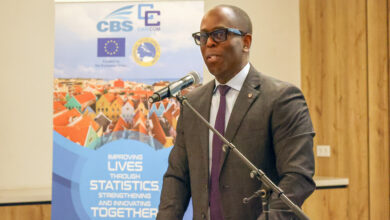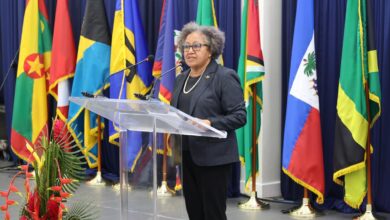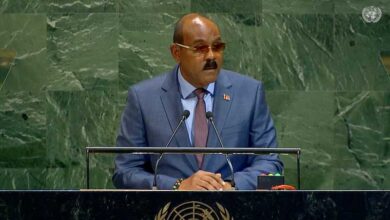(CARICOM Secretariat, Turkeyen, Greater Georgetown, Guyana) Against the background of dire warnings of the short and long-term effects of climate change on the Caribbean, Regional scientists have called for a change in individual behaviours and practices, a more integrated approach and political intervention at the highest level to mitigate those impacts.
At a video conference at the Caribbean Community (CARICOM) Secretariat on Monday April 23, 2007 to launch the Fourth Assessment Report of the Inter-governmental Panel of Climate Change (IPCC), scientists from the Caribbean Community Climate Change Centre (CCCCC), the University of the West Indies and the World Meteorological Organisation, projected impacts that cut across the agricultural, health and tourism sectors.
The team at the conference was led by Executive Director of the Climate Change Centre in Belmopan, Belize, Dr. Kenrick Leslie and included Dr Ulric Trotz, Science Adviser and a Review Editor of IPCC Working Group II Report; Dr. John Agard of the University of the West Indies and Mr. Carlos Fuller, Chief Meteorologist of the National Meteorological Service of Belize and the current President of the World Meteorological Organisation, Regional Association IV, comprising North America, Mexico, Central America and the Caribbean.
While the findings confirmed and strengthened previous observations reported before, new evidence makes it clear that small islands are especially vulnerable to climate change and that the impacts will be largely adverse, the Report said.
Among the projected impacts of climate change on Caribbean Countries are:
• extended periods of drought and reduced soil quality through increasing soil salinisation especially near coastal areas
• inevitable rise in food importation costs in response to reduced crop productivity in traditional markets
• extreme events such as hurricanes, floods and drought can lead to severe damage top food and commercial crops
• serious impact on water supply and island economies if there is any reduction in average rainfall
• inundation, erosion and other coastal hazards resulting from sea-level rise
• negative impacts on coastal ecosystems such as coastal reefs and mangrove forests and commercial and artisanal fisheries based on those systems
• an increase in the incidence of vector-borne diseases such as dengue fever and malaria
• an increased risk of diseases such as cholera, diarrhea and dengue fever due to shortages of fresh water, poor water quality during periods of drought and contamination of fresh water supplies during floods and storms
• ciguatera fish poisoning due to warmer sea surface temperatures during El Nino events
• accelerated beach erosion, degradation of coral reefs and the degradation of the overall asset value of the coast due to sea level rise and increased ocean temperatures
• changes that will affect vital environmental components of holiday destinations which could have repercussions for the tourism-independent economies
The Conference saw reaffirmations of support for the awareness and adaptation measures in the Region, from British High Commissioner to Guyana, H.E Fraser Wheeler, and Canadian High Commissioner to CARICOM, H.E Charles Court.
The findings of the report with regard to adapting to climate change underscored what CARICOM Deputy Secretary General, Ambassador Lolita Applewhaite described as a “survival issue” for the small island developing states of the Caribbean.





